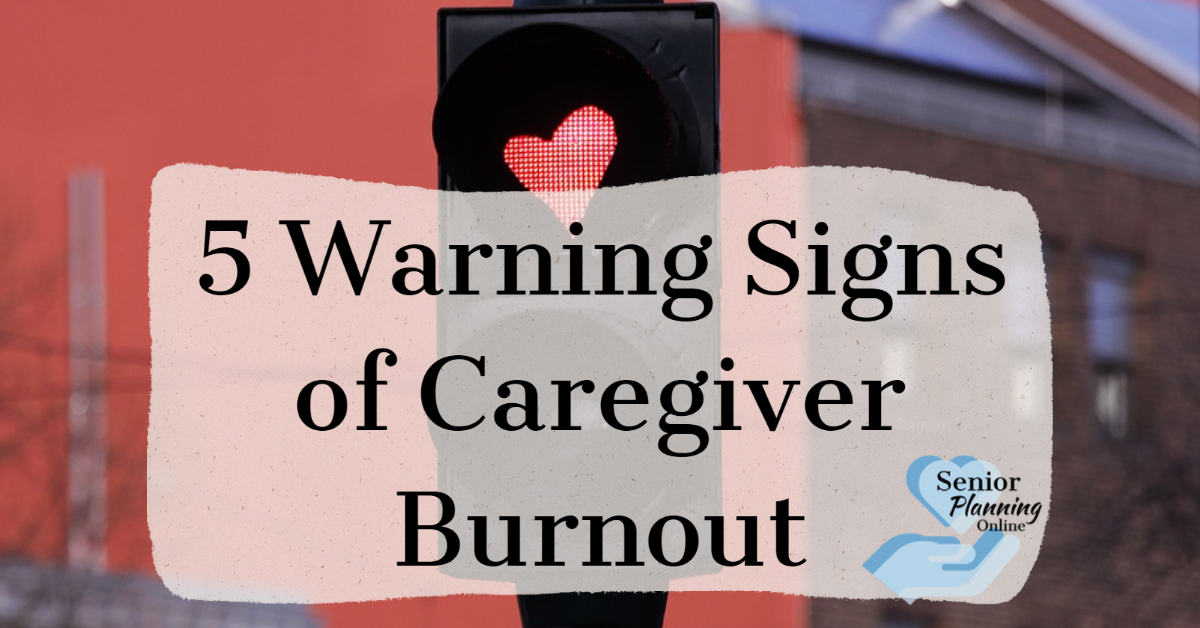Caregiving for a loved one is hard. No one understands what you are going through unless they have been there themselves. It’s an emotional roller coaster and physically exhausting.
Caregivers do it out of love, a sense of responsibility and because they want what is best for their loved one. But Caregiver Burnout is REAL. It goes beyond caregiver stress.
As a social worker, I work with caregivers daily and I see the toll it takes on them emotionally and physically.
I applaud their efforts and courage to take on the difficult task of caring for someone else. However, it’s important for caregivers to take care of themselves FIRST, especially to avoid Caregiver Burnout.
In this article I’ll explain What Caregiver Stress vs Caregiver Burnout is and go over the warning signs to look out for. If you are concerned you may be heading towards Caregiver burnout, take the Caregiver Burnout Quiz and learn about ways you can take care of yourself.

What is Caregiver Burnout?
Burn out and stress are often used interchangeably. However, there is a difference.
Stress
Stress is the feeling of pressure to the point it is pushing us outside of our comfort zones. It can come in different forms. Feeling overwhelmed, overworked, and anxious. It can cause us to feel worried, exhausted, and even depressed.
It can cause difficulty with concentration and memory and can even affect our physical health.
However, stress is often temporary. There are good days and feelings that there is a light at the end of the tunnel. That hope pushes us and motivates us to keep going. Either because we feel we have to or because we believe it will end in something good.
Caregiver stress can be the beginnings of burnout if the caregiver is unable to find healthy ways to cope with the stress and find ways to relieve it at times. If it does not end up being a temporary experience, it turns chronic.
Burnout
Burnout on the other hand, is chronic stress extended over a long period of time.
It can lead to emotional, mental and physical health problems. Our bodies can only handle so much stress before they begin to break down. They weren’t meant to handle chronic stress over years.
Burn out can also lead to unintended abuse and neglect towards the person being cared for.
So it’s important to identify when we are feeling stressed versus if we are heading into the start of burnout. You can take the Caregiver Burnout Quiz below to see where you fall.

Warning Signs of Burnout
1. Changes in Mood
Depression and anxiety are big signs of caregiver stress and caregiver burnout.

Depression can look like many things. Sometimes we don’t realize we are experiencing some depression. People often believe depression looks like someone who is sad all of the time, but there are more symptoms than just depressed mood.
You may be experiencing depression if you are experiencing feelings of hopelessness, loss of interest in things you used to enjoy, changes in energy, and changes in sleep patterns or eating patterns.
If you are starting to have any thoughts of harming yourself or others, or thoughts that you would be better off dead, I urge you to call the National Suicide Prevention Line at 1-800-273-8255. Someone can help. Your life is worth it!
Anxiety can be felt separately or along with feelings of depression. Anxiety can manifest itself mentally and physically. It’s more than excessive worry.
Some physical signs include fast heart beat, heavy and fast breathing; hot flashes, chest pain and dizziness.
Mental and emotional indications of anxiety include feelings of dread or panic, racing thoughts and excessive worry.
Irritability and anger are signs and symptoms of anxiety and depression as well.
Feeling frustrated with the person you are caregiving for or with friends and family is a big sign of caregiver burn out. Lashing out for small things and having a short fuse is something that any normal person experiences when they have been put under chronic stress.
Unfortunately, irritability, resentment and anger can lead to unintentional abuse or neglect can occur. This is why it’s important to find healthy outlets for your anger. Talk to someone to vent to.
Often times, anxiety and depression go hand in hand. People experiencing depression often also have symptoms of anxiety. Talk to your doctor if you are experiencing anxiety or depression.
2. Changes in Sleep
Changes in sleep are not only a sign of caregiver burnout or caregiver stress, they are also indications of depression or anxiety. Sleep is vital to our health and well-being.
Trouble falling or staying asleep and even sleeping more than usual can be common as a caregiver. Caregivers may have to supervise their loved one overnight due to wandering behaviors or safety concerns.
Some caregivers stay up worrying about how they are going to pay bills now they are caring for someone full time.
If you are experiencing any of these changes in your sleep patterns, you may have caregiver burnout or caregiver stress. If this persists, it can have lasting effects on your health. Talk to a doctor about these changes. They may be able to help. Also, try initiating a good sleep hygiene routine.
3. Caregiver Fatigue
Having little to no energy is described as part of caregiver fatigue. Difficulty getting up in the morning both mentally and physically is a sign of stress and burnout. Feeling like the day is dragging or that the need for more caffeine to keep you going are signs of caregiver fatigue.
4. Health problems
Experiencing chronic stress takes a toll on our bodies. It leads to a compromised immune system.
When you don’t get enough sleep, aren’t eating well, and not taking care of yourself emotionally, your body isn’t getting the nutrients and care you need to fight off infections.
Most caregivers are so focused on the person they are caring for, their own health becomes neglected. They are too worried about the other person’s doctor’s appointments to make their own.
If you let your health deteriorate, how can you continue to care for your loved one? You may end up being the one that needs to be taken care of. That’s not helpful for you or the person you are caring for.
5. Forgetfulness or difficulty concentrating
Forgetting events or appointments is very common with caregiver burnout. Keys may be forgotten in the refrigerator, or maybe you forgot your spouse’s birthday. You may be finding that you are missing doctor’s appointments for either you or your loved one.
Don’t worry, you aren’t developing dementia. But this is part of burn out. Take a step back and ask yourself if you are experiencing any of the other signs of burnout. This is a good indication that you need a break.
Coping with Caregiver Stress
Finding ways to cope with stress is important to avoid caregiver burnout.
Try 6 Tips to Prevent Caregiver Burnout
Reaching out for help to friends, family or health care professionals can help alleviate some of your stress. It also may be time to think of an alternative living situation or caregiver situation for your loved one.
There are different senior care living community options that may work for your and your loved one. Sometimes it just takes the right place.
If your loved one has dementia and you are considering a memory care facility, check out our post “How Memory Care Facilities are Set Up” for information on what to expect and what to look for.
If you are looking into nursing homes we have a few posts that may be helpful: “Are Skilled Nursing Facilities the Same as Nursing Homes?” and “Top 15 Questions to Ask a Skilled Nursing Facility“.


5 Responses
What a great article!!! Caregiver burnout is so important to acknowledge. I work in home
Care and I always reach out to the caregiver to see how They are doing! So important!
Thank you for your comment. I’m glad you liked the article. It’s so great to hear that you reach out to the caregivers and address their needs as well. Sometimes they need to be asked how they are doing too!
This is a great article!! Sometime I forget so much I think I’m losing my mine I take care of my husband 24/7 and our 2 little dogs, and it is very hard sometimes I go to spare room and just cry then it helps but we have wonderful friends there always there for me.. Thank you for the article.
Betty, thanks for reading and sharing! Being a 24/7 caregiver is so challenging! You are doing an amazing job. Know that you are. This is not something we were meant to do alone and here you are rocking it. Make sure you allow these friends to help you when they offer. Don’t feel guilty, they want to help. We were put on this Earth to help others and if we deny them of that then we aren’t allowing them to serve their purpose. Keep caring for yourself!
Thanks for such a great article – very well written and thoughtful! Thanks for starting a conversation in an area that might be overlooked at times.